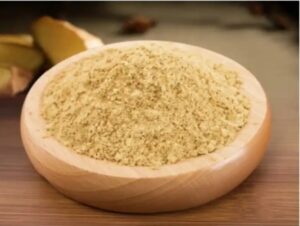
Zingerone is a natural compound found in the rhizome of the ginger plant. It is a member of the gingerol family of compounds and is responsible for the pungent taste and aroma of ginger. Zingerone has been studied for its various potential health benefits, including its anti-inflammatory, antioxidant, and anti-cancer properties. It is also known for its digestive and anti-nausea effects. Additionally, zingerone has shown potential in improving insulin sensitivity and reducing blood glucose levels, making it a potential aid in managing diabetes. Overall, zingerone is a bioactive compound with several potential health benefits, but more research is needed to fully understand its mechanisms of action and therapeutic potential.
Chemical Composition
Zingerone is a natural compound found in ginger. Its chemical formula is C11H14O3.
The compound belongs to a group of compounds known as phenylalkanones, which are characterized by the presence of an alkyl group (R) attached to a phenyl ring.
Zingerone is a yellowish oil that is soluble in organic solvents and insoluble in water. It has a strong aroma and is responsible for the characteristic spicy and pungent taste of ginger.
The chemical structure of zingerone consists of a phenyl group attached to a ketone functional group (C=O) and a methoxy group (-OCH3) attached to the phenyl ring. It also contains a hydroxyl group (-OH) attached to the phenyl ring.
The presence of the methoxy group and hydroxyl group in zingerone accounts for its antioxidant and anti-inflammatory properties. These properties make zingerone a potentially useful compound in various applications, such as in the food and pharmaceutical industries.
Overall, the chemical composition of zingerone includes carbon (C), hydrogen (H), and oxygen (O) atoms, arranged in a specific arrangement to form its unique structure and properties.
Pharmacological benefits of Zingerone
Zingerone has been the subject of numerous scientific studies, which have suggested that it possesses various pharmacological benefits. Some of these include:
Anti-inflammatory properties
Zingerone, a natural compound found in ginger, has been found to have anti-inflammatory properties.
- Inhibits inflammatory mediators: Zingerone has been shown to inhibit the production of various inflammatory mediators like prostaglandins, cytokines, and leukotrienes. These mediators play a crucial role in the inflammatory response and contribute to the development of chronic inflammatory conditions.
- Suppresses inflammatory pathways: Zingerone can suppress several inflammatory signaling pathways, including nuclear factor-kappa B (NF-κB), mitogen-activated protein kinases (MAPKs), and Janus kinase/signal transducer and activator of transcription (JAK/STAT) pathways. Inhibition of these pathways helps reduce inflammation and related symptoms.
- Reduces oxidative stress: Zingerone possesses strong antioxidant properties and helps reduce oxidative stress, which is often associated with inflammation. Oxidative stress can lead to the production of inflammatory mediators and tissue damage. By neutralizing free radicals and reducing oxidative stress, zingerone helps mitigate inflammation.
- Decreases inflammatory cell infiltration: Zingerone has been shown to reduce the infiltration of inflammatory cells into tissues. Excessive infiltration of immune cells, such as neutrophils and macrophages, can worsen inflammation. Zingerone helps regulate immune cell migration and infiltration, thereby reducing inflammation.
- Modulates immune response: Zingerone can modulate the immune response, preventing the overactivation of immune cells and the release of excessive pro-inflammatory cytokines. This modulation helps maintain a balanced immune response and prevents chronic inflammation.
Overall, zingerone has been shown to possess notable anti-inflammatory properties through its ability to inhibit inflammatory mediators, suppress inflammatory pathways, reduce oxidative stress, decrease inflammatory cell infiltration, and modulate the immune response. These properties make zingerone a potential therapeutic option for managing various inflammatory conditions.
Antioxidant effects of Zingerone
Zingerone is a natural compound found in ginger root that has been reported to have antioxidant effects. Antioxidants are compounds that help protect the body against oxidative stress, which occurs when there is an imbalance between free radicals and antioxidants in the body.
Numerous studies have investigated the antioxidant properties of zingerone and have found it to have potent antioxidant effects. These effects are primarily attributed to its ability to scavenge free radicals and inhibit oxidative stress.
Research has shown that zingerone can increase the activity of antioxidant enzymes, such as superoxide dismutase (SOD), catalase, and glutathione peroxidase. These enzymes play a crucial role in neutralizing free radicals and reducing oxidative damage.
Furthermore, zingerone has been found to have the ability to inhibit lipid peroxidation, which is a process that damages cell membranes and contributes to various diseases. By preventing lipid peroxidation, zingerone can help protect cells from oxidative damage and maintain their structural integrity.
In addition to its antioxidant effects, zingerone has also been reported to have anti-inflammatory, antimicrobial, anticancer, and neuroprotective properties. These additional properties further contribute to its overall health benefits.
Overall, zingerone has demonstrated strong antioxidant effects, which make it a promising natural compound for potential therapeutic applications in preventing or treating oxidative stress-related conditions. However, further research is needed to fully understand its mechanisms of action and its potential benefits in human health.






